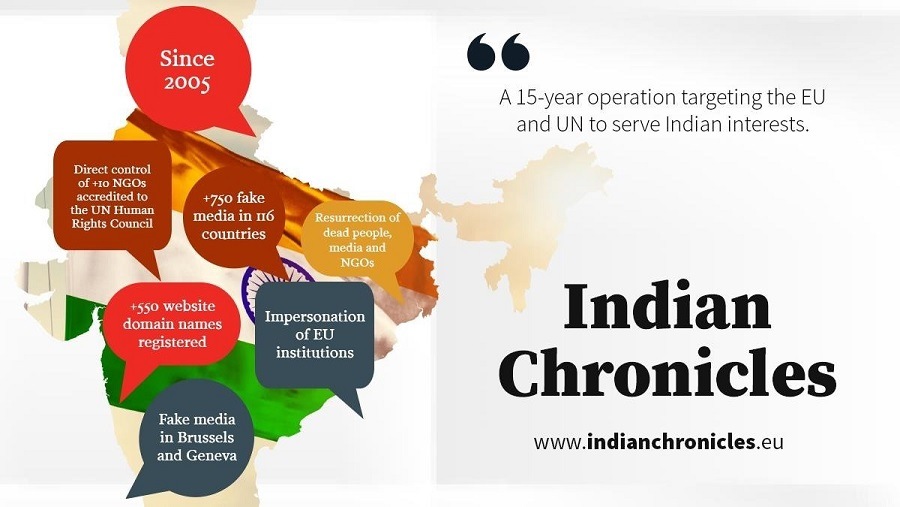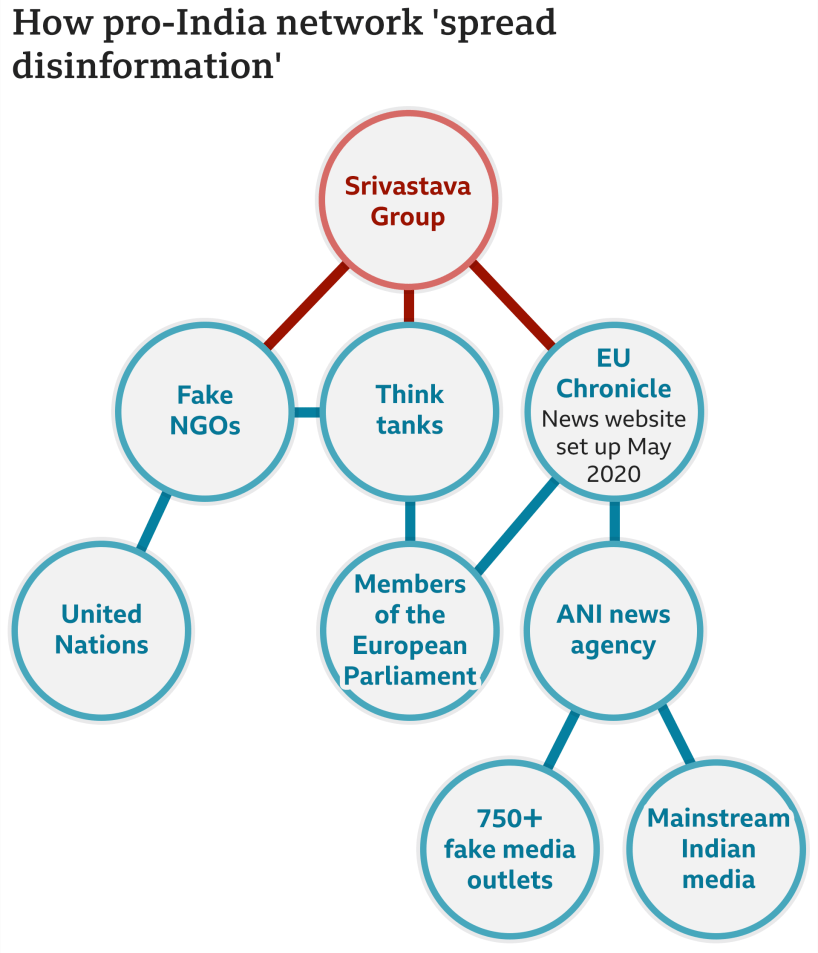

By Amal Malik, student of BA Comparative Literature, with an interest in post-colonialism.
14 January 2021
The EU DisinfoLab is an independent NGO that refutes disinformation campaigns that undermine the European Union’s integrity, core values and institutions. In a scathing report released on December 9th, 2020, researchers and online investigators unveiled a 15-year-long propaganda campaign pioneered by the Srivastava Group (SG), an Indian holding company with branches in industries including healthcare, trading, media, travel and natural resources.
The campaign created a network of 750 fake media outlets across 119 countries, primarily through Asian News International (ANI) and was responsible for the impersonation of deceased Professor Louis B. Sohn who was considered the “grandfather of international human rights law in the United States”. Among the ‘resuscitation’ of Professor Sohn, several other notable MEPs were impersonated, and news reports were substantiated by pseudo-think tanks and NGOs that were either dismantled years prior to the production of new news stories by the illegitimate media channels or never existed in the first place.
49% of the ANI, which holds a monopoly over the Indian media, is ironically owned by Thomson Reuter, which is one of the most trusted news agencies in the world.
Now, before we delve into the tactics and the extent to which they were effective, what was the purpose of this elaborate ruse? What motivated the Srivastava Group (SG) to create such an intricate propaganda machine? As the report unveils, the operation’s mission is ‘to discredit nations in conflict with India in Asia, in particular Pakistan but also China to a lesser extent’. The campaign was designed to improve India’s reputation in the eyes of global institutions, including the EU and the UN and to simultaneously tarnish Pakistan and other countries’ reputations. As for the SG, there are currently no substantiated links between it and the Indian government, however, the organisation has been linked to political controversy, such as its funding for right-wing MEPs to visit Indian-occupied Kashmir.
Furthermore, Editor-in-Chief of New Delhi Times and one of the directors of the Srivastava Group, Ankit Srivastava has made his stance explicitly clear on Twitter in his depiction of the “Islamist terrorism emanating from the evil that is Pakistan”. Mr. Srivastava regularly produces streams of anti-Pakistan content through his paper, often distorting political events to fit the right-wing Indian narrative.
Tactics and the Struggle for ‘Minority Rights’
Several of the inauthentic media platforms assumed the guise of defunct newspapers to maintain a false sense of credibility. Another popular SG strategy was the outright impersonation of credible agencies including the EU Observer, the Economist and Voice of America.
European Parliament letterheads were used to procure false documents and website were registered with fake addresses leading to the UN to further cement a guise of reliability. Pictures of the UK Government Minister and the BBC Director were used out of context to perpetrate an anti-Pakistan narrative and deceased figures, like Professor Sohn, who passed away in 2006, seemed to magically appear at a UNHRC meeting in 2007 and at an event organised by “Friends of Gilgit-Baltistan” in Washington in 2011.
The Indian resurrection trick was not merely confined to news platforms or renowned academics: the US-based think tank, the Commission to Study the Organization of Peace (CSOP), which had become inactive in the late 1970s, seemed to somehow reappear in 2005. The Srivastava Group’s incognito use of the CSOP, which was formerly affiliated with the United Nations Economic and Social Council (ECOSOC), was another attempt to further bolster its façade of credibility.
Alexandre Alaphilippe, Executive Director of EU DisinfoLab, spoke to the BBC about the dangers of this extensive propaganda campaign: “more than the fake media outlets alone, it is their combination with the fake NGOs that’s really worrying because it provides a mirage of online and grassroots support to a cause. That’s exactly where the disinformation lies.”
Several of these media outlets maintained a presence within Geneva and the UNHRC, illustrating protests against the alleged ‘abuse of minority rights’ within Pakistan in attempts to conflate the nation with terrorism and a disregard for fundamental human rights.

Source: EU DisinfoLab ‘Indian Chronicles’ Report
Fake News, Real Results?
Recently, the EU DisinfoLab debunked the EU Chronicle, a relatively new fake media platform with non-existent journalists, which claims to report European affairs. In reality, the platform is a means to cajole MEPs into agreeing with Indian agendas. Since its conception 6 months ago, 11 MEPs have supposedly endorsed the platform’s opinion pieces, demonstrating merely a few of the tangible results of the campaign.
However, upon closer examination, Angel Dzhambazki, who supposedly contributed to with an ‘article’ of his own, claims to have never done so.
“We suspect that part of this material is taken from a plenary statement MEP Dzhambazki made on the COVID crisis and that the rest of the text has been made up and added as if written by him,” claimed an official from Dzhambazki’s office, who is now considering legal means to deal with the issue.
Furthermore, the EU DisinfoLab unveiled “an entire network of coordinated UN-accredited NGOs promoting Indian interests and criticizing Pakistan repeatedly”, with at least ten of them bearing ties to the Srivastava Group.
In turn, these NGOs cooperated with unofficial think tanks and minority rights groups within Genvea and Brussels, such as Baluchistan House, the European Organization for Pakistani Minorities (EOPM) and the South Asia Democratic Forum (SADF), which were also fabricated by SG. Scathingly, “these think-tanks and NGOs are in charge of lobbying, of organising demonstrations, speaking during press conferences and UN side-events, and they were often given the floor at the UN on behalf of the accredited organisations.”
The EU DisinfoLab even traced the creation of fake companies in Canada to indoctrinate South-Asians based within North America, created fake media in Bangladesh, the Maldives and several African countries. While the report could not extensively cover the reach within these nations, the ubiquitous reach of the disinformation campaign is highly alarming.
Furthermore, the substantial lack of international outrage and lack of action, legal or diplomatic, to disarm these propaganda machines, is even more startling.
While the ‘Indian Chronicles’ may have exposed a substantial chunk of the propaganda campaign, several of the platforms and groups identified in the report still remain active and will continue to circulate misinformation against Pakistan and its allies. In this midst of this fifth-generation warfare, we are reminded about the ease with which masses of people can be manipulated and how pseudo-credible snippets of news – from articles to video clips to tweets – can embed themselves in our minds if they possess the right aesthetics and jargon, re-moulding our perception of reality.
Until action is taken to disarm these institutions, it is our intellectual duty to remain conscientious about what we read and spread.
Disclaimer: The views expressed in the article are of the author and do not necessarily represent the institute’s policy.

